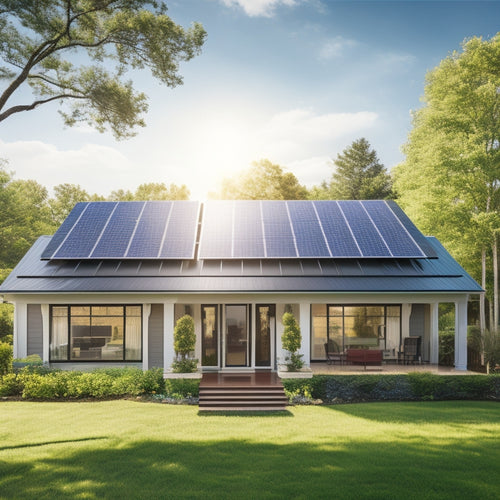
Off Grid Home Power Systems
Share
You're considering an off-grid home power system, which means you're taking the first step towards energy independence, reduced carbon footprint, and significant savings on your energy bills. You'll want to assess your daily energy demands, identifying essential appliances and calculating your daily energy usage in watt-hours. Properly sizing your power system is vital to achieving energy independence. With advances in solar and wind technologies, you can rely on renewable energy sources to minimize your reliance on public utilities. As you investigate off-grid power systems further, you'll uncover the importance of inverter efficiency, battery maintenance, and energy storage solutions that can optimize your energy yield and reliability.
The Essentials
- Off-grid home power systems promote energy independence through renewable sources like solar and wind, reducing reliance on public utilities.
- Investing in off-grid solar kits and wind turbines allows homeowners to control their power needs and achieve energy self-sufficiency.
- Proper sizing of power systems based on daily energy usage is essential for consistent energy supply and minimizing reliance on fossil fuels.
- Inverter efficiency and performance play a crucial role in off-grid systems, with high conversion efficiency minimizing energy loss and optimizing AC power output.
- Assessing and identifying energy demands is vital for off-grid power system design, considering essential appliances, energy storage options, and lifestyle adjustments to reduce energy consumption.
Energy Independence Matters Most
You're likely considering an off-grid home power system because you want energy independence, and that means relying on renewable energy sources like solar or wind power.
By investing in an off-grid solar kit, you can break free from the constraints of traditional energy sources and enjoy the peace of mind that comes with knowing you have control over your own power needs.
These sources can be utilized to power your daily life, from lighting and heating to refrigeration and entertainment.
Renewable Energy Sources
What's driving the quest for energy independence, and how can renewable energy sources help achieve it? You're likely seeking freedom from reliance on public utilities and a reduced carbon footprint.
Renewable energy sources are the key to releasing this independence. By investing in Home Energy Independence solutions, individuals can reduce their reliance on the grid, offering lower energy bills and protection from rising utility costs energy self-sufficiency.
You can utilize the power of the sun with solar panel technology, which has become increasingly efficient and affordable. Advances in photovoltaic cells have led to higher energy yields, making solar a viable option for powering your off-grid home.
Additionally, wind turbine advancements have made wind energy a reliable choice, especially in areas with consistent wind patterns.
Powering Daily Life
Your off-grid home's daily life relies heavily on a consistent and reliable energy supply. To guarantee this, you'll need to evaluate how to power your daily life efficiently. A well-designed power system will provide you with the freedom to live life on your own terms.
By leveraging Off Grid Solar Panel Kits sustainable living solutions, you can overcome the challenges of traditional solar panel systems and achieve energy independence. Additionally, these kits can help you minimize your carbon footprint and reduce your reliance on fossil fuels.
When it comes to powering your daily life, solar panel installation and wind turbine efficiency are vital considerations. Solar panels can provide a significant portion of your energy needs, especially during peak sunlight hours. However, wind turbines can supplement your energy supply during periods of low sunlight or at night.
By optimizing the efficiency of these systems, you can reduce your reliance on fossil fuels and minimize your carbon footprint.
To achieve energy independence, it's important to size your power system correctly. You'll need to calculate your energy requirements based on your daily energy usage. This includes factors such as lighting, refrigeration, and heating.
Reduced Carbon Footprint Guarantee
When you opt for an off-grid home power system, you're not only gaining energy independence, but you're also ensuring a reduced carbon footprint guarantee.
By incorporating lower emission energy sources, such as solar, wind, or hydro power, you'll greatly minimize your reliance on fossil fuels.
For instance, off-grid solar power systems can provide a reliable source of renewable energy for your home.
With renewable energy options, you can rest assured that your home is powered by clean energy, reducing your impact on the environment.
Lower Emission Energy Sources
Their quest for energy independence leads many off-grid homeowners to prioritize lower emission energy sources, assuring a reduced carbon footprint.
You're likely considering alternative energy sources that minimize your impact on the environment. Solar thermal systems, for instance, provide heat for your home and water, reducing your reliance on fossil fuels. Biomass energy, generated from organic matter, is another option. Wind turbines, geothermal heating, and hydroelectric systems are also viable alternatives.
To guarantee a stable power supply, energy storage solutions like batteries are essential. Microgrid systems integrate multiple energy sources, providing a reliable and efficient power supply. Fuel cells, which convert chemical energy into electricity, offer a clean and quiet alternative.
If you're interested in sustainable agriculture, you may want to investigate biogas generators that convert organic waste into electricity and heat. For coastal off-grid homes, wave energy utilizes the power of ocean waves to generate electricity.
Renewable Energy Options
By incorporating lower emission energy sources into your off-grid home power system, you've taken a significant step towards minimizing your carbon footprint.
Now, it's time to investigate renewable energy options that can further reduce your reliance on fossil fuels.
Solar panel options are a popular choice for off-grid homes, providing a clean and quiet source of energy. With advancements in technology, solar panels have become more efficient and affordable.
You can choose from a range of options, including monocrystalline, polycrystalline, and thin-film panels, each with its own benefits and drawbacks.
Wind turbine benefits are another attractive option for off-grid homes. Wind turbines can generate power consistently, especially in areas with high wind speeds.
They're also relatively low-maintenance and can last for decades with proper installation. When combined with solar panels, wind turbines can provide a reliable and consistent source of energy.
Inverter Conversion Efficiency Matters
When selecting an inverter for your off-grid home power system, you'll want to prioritize high conversion efficiency to minimize energy loss. This is essential because even small inefficiencies can add up quickly, reducing your system's overall peak power output.
For instance, top off grid inverters like Renogy and Victron offer high conversion efficiency, ensuring reliable AC power anywhere without relying on the grid or noisy generators.
Peak Power Output
Utilizing peak power output from your off-grid home power system relies heavily on the efficiency of your inverter's conversion process. When you're living off the grid, you need your system to perform at its best, and that means maximizing power output while minimizing energy waste.
To achieve peak performance, you'll want to focus on power management. This involves optimizing your inverter's conversion efficiency to guarantee that the energy generated by your system is being used effectively.
A high-efficiency inverter is vital for peak power output. Look for an inverter with a high conversion efficiency rating, typically above 95%. This guarantees that most of the energy generated by your system is being converted into usable power.
Additionally, consider an inverter with advanced features like maximum power point tracking (MPPT) and built-in monitoring capabilities. These features help optimize energy production and provide real-time understanding into your system's performance.
Energy Loss Reduction
In optimizing your off-grid home power system, energy loss reduction plays a vital role in achieving peak power output. You want to confirm that the energy generated by your system is efficiently converted and employed. One important aspect of energy loss reduction is inverter conversion efficiency. The inverter's job is to convert DC power from your solar panels or wind turbines to AC power for your home. However, this process is not 100% efficient, and some energy is lost as heat.
To minimize energy loss, it is important to choose an inverter with high conversion efficiency. Here's a comparison of inverter efficiency ratings:
| Inverter Model | Efficiency Rating | Energy Loss |
|---|---|---|
| Inverter A | 90% | 10% |
| Inverter B | 95% | 5% |
| Inverter C | 98% | 2% |
As you can see, even a small increase in inverter efficiency can result in significant waste reduction. By selecting an inverter with high energy efficiency, you can reduce energy loss and maximize your off-grid power system's performance. This is vital in achieving energy independence and minimizing your reliance on the grid.
Assess Your Energy Demands
You'll need to determine how much energy your off-grid home requires to function daily.
To do this, identify the essential appliances and devices you'll be using, and calculate your daily energy usage in watt-hours (Wh).
When selecting an off-grid solar battery, consider options like Renogy deep cycle solar batteries that can provide reliable energy storage for your home.
This will help you size your power system accurately and guarantee it can meet your energy demands.
Identify Energy Needs
Evaluating your energy requirements is essential for designing an off-grid home power system that meets your needs. You'll need to assess your energy consumption patterns to determine how much power you'll require to sustain your lifestyle. This involves identifying the appliances and devices you can't live without, as well as those you can compromise on.
Reflect on the type of lighting, heating, and cooling systems you'll need, and the power requirements of your refrigerator, stove, and other essential appliances.
Be honest about your energy usage habits and ponder potential lifestyle adjustments that can reduce your energy consumption. For instance, switching to energy-efficient LED lighting or using a propane-powered stove can considerably lower your energy needs.
You may also need to evaluate upgrading to energy-efficient appliances or investing in power-hungry devices like water pumps or electric heaters. By accurately identifying your energy needs, you can design a system that provides reliable power while minimizing your reliance on non-renewable energy sources.
Calculate Daily Usage
Your daily energy usage is the foundation of your off-grid home power system's design. To calculate your daily usage, you'll need to assess your energy demands. Start by identifying the appliances and devices you'll be powering, including lights, refrigeration, computers, and any other essentials.
Next, determine the wattage of each item and how many hours you'll use them per day.
Energy monitoring is vital in understanding your usage patterns. You can use a Kill A Watt meter or a similar device to measure the energy consumption of each appliance. This will give you an accurate depiction of your daily energy needs.
Make a list of the total watt-hours (Wh) per day for each appliance, and then add them up to get your total daily energy usage.
Be sure to reflect on your usage patterns, such as peak usage times and seasonal variations. For example, you may use more energy during the winter months for heating or during the summer months for cooling.
Longer Battery Life Guaranteed
You'll want to guarantee your off-grid home power system's batteries last as long as possible, and proper maintenance is key.
Battery Maintenance Tips
Properly maintaining your off-grid home power system's batteries is essential to guarantee a steady supply of electricity.
You'll want to develop a maintenance schedule that suits your specific battery type, whether it's lead-acid, lithium-ion, or nickel-cadmium. Regular inspections will help you identify potential issues before they become major problems.
When charging, make sure you follow proper practices to avoid overcharging, which can reduce your battery's lifespan.
Safety precautions are important when working with batteries. Wear protective gear, and make certain the area is well-ventilated.
Performance monitoring is key to extending your battery's lifespan. Keep an eye on voltage, temperature, and charging cycles to detect any anomalies.
Troubleshooting techniques will help you identify and fix issues quickly. Store your batteries in a cool, dry place, away from extreme environmental factors like extreme temperatures or humidity.
Frequently Asked Questions
Can I Install an Off-Grid System Myself or Do I Need a Professional?
You're wondering if you can tackle a DIY installation, but safety considerations are essential; unless you're experienced with electrical systems, it's recommended to hire a professional to guarantee a safe and efficient setup.
How Often Should I Maintain My Off-Grid Home Power System?
You should perform routine maintenance on your system every 3-6 months to ascertain system longevity, following a maintenance checklist to inspect and replace components, clean equipment, and check performance to confirm ideal energy output.
Are Off-Grid Systems Compatible With All Types of Homes?
A million possibilities await as you seek energy independence! You'll find that off-grid systems are surprisingly adaptable, compatible with most homes, and can even enhance system efficiency, giving you the freedom to live life on your own terms.
Can I Add More Solar Panels to My Existing System Later On?
You can expand your existing setup by adding more solar panels, but consider system expansion considerations, ensuring solar panel compatibility and evaluating your energy needs to maximize output and minimize potential integration issues.
Do Off-Grid Systems Work Well in Areas With Frequent Power Outages?
In the midst of tempests, thou seekest refuge from frequent power outages; with battery storage, thou shalt utilize energy independence, for off-grid systems, like a trusty sentinel, stand vigilant, unfazed by the whims of the grid.
Final Thoughts
As you flip the switch to energy independence, your off-grid home power system hums to life, a guiding light of self-sufficiency in a world still tied to the grid. With a reduced carbon footprint, inverter efficiency, and a thorough comprehension of your energy demands, you've crafted a system that's the perfect blend of form and function. And with longer battery life guaranteed, you can rest easy, knowing your power will shine bright like a North Star, guiding you through even the darkest of nights.
Related Posts
-

Top Portable Refrigerators for Camping Adventures
When you're camping, having a reliable portable refrigerator can make all the difference for keeping your food fresh ...
-

Replacing Old Appliances With Sustainable Alternatives
Replacing old appliances with sustainable alternatives can change your home into an energy-efficient space. Not only ...
-

Home Solar Installation Cost
You're considering installing solar panels on your home, and the upfront cost is likely the biggest hurdle standing i...


